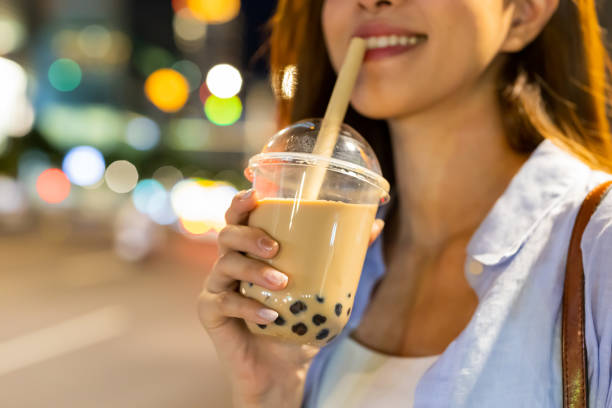“It started as just a mild stomach ache… then suddenly she passed out.”
That was the heartbreaking statement of a mother whose daughter ended up in the ICU after regularly drinking milk tea — a beverage loved by millions, especially among children and teenagers.
Now, doctors are sounding the alarm. What seems like a sweet, innocent treat may hide toxic dangers — especially in cheap, mass-produced milk tea products.
Are you really sure you know what your child is drinking every day?
This isn’t just a story meant to scare — it’s a harsh wake-up call for all parents, guardians, and milk tea lovers.
THE DARK SIDE OF MILK TEA: WHAT’S REALLY INSIDE THAT CUP?

We often associate milk tea with happiness, social bonding, and indulgence. But behind the chewy pearls and sugary taste, some versions of this popular drink may contain harmful, even illegal, substances that pose serious risks to human health.
Do you know what’s really in your “sweet” milk tea? 
Let’s take a closer look at some of the most alarming ingredients found in low-quality milk tea products:
 Magic Sugar – The Sweet Killer
Magic Sugar – The Sweet Killer

Often used as a cheaper substitute for natural sugar, “magic sugar” is a banned artificial sweetener that has been linked to liver and kidney damage. It’s appealing to vendors because of its low cost and strong sweetness — just a tiny amount can sweeten an entire cup.
But at what cost?
Long-term consumption, especially in children, may cause serious metabolic issues and organ failure. Some forms of magic sugar have even been flagged as carcinogenic (cancer-causing) in laboratory tests.
 Synthetic Flavorings – Tastes Addictive, Acts Destructively
Synthetic Flavorings – Tastes Addictive, Acts Destructively
That signature “brown sugar,” “strawberry,” or “matcha” flavor you love? It may not be real. Many budget milk tea shops use chemical-based flavorings to imitate natural tastes.
These artificial flavorings may trick the brain and overstimulate the nervous system, leading to potential side effects such as headaches, dizziness, hyperactivity in children, and in extreme cases, even neurotoxicity with frequent exposure.
Some of these compounds are not approved by health authorities in many countries, yet continue to circulate in underground markets and unregulated stores.
 Artificial Pearls – The Truth Behind That Chew
Artificial Pearls – The Truth Behind That Chew

The chewy tapioca pearls — a fan favorite in milk tea — are often made industrially using plasticizers and chemical softeners to create that perfect “bite.”
A 2023 lab test in Asia revealed that some pearls contained compounds used in rubber production — chemicals that should never enter the human digestive system.
And if that weren’t enough, poorly stored pearls can harbor bacteria, mold, or fungus. Combine that with sugar and dairy, and it becomes a perfect environment for contamination.
HOW ONE CUP A DAY BECAME A HEALTH NIGHTMARE
The little girl who ended up in the ICU drank one cup of milk tea per day — nothing extreme, just part of her daily routine after school.
Her symptoms started as mild stomach pain and fatigue. The family thought it was simple indigestion — until she collapsed and lost consciousness. Doctors later linked the incident to the artificial compounds found in the milk tea she regularly consumed, particularly the dangerous sweeteners and unverified ingredients.
This case is not isolated. Across Asia, similar reports have surfaced: children developing liver inflammation, teens having allergic reactions, and others suffering long-term gut issues — all traced back to unclean or chemically-laced milk tea products.
WHY CHILDREN ARE AT GREATER RISK
Children’s organs are still developing. Their bodies are more vulnerable to toxins, chemicals, and artificial substances. What may be tolerable to an adult can be toxic to a child.
Many parents, unaware of the ingredients, allow their children to drink milk tea regularly — thinking it’s just another sweet treat. But over time, these drinks may:
Overload their sugar tolerance
Interfere with their digestion
Damage liver and kidney function
Affect mood, sleep, and concentration
BUT IT’S TRENDY… AND CHEAP?
That’s exactly the problem.
Many street vendors and budget milk tea shops cut costs to keep prices low and profits high. They don’t disclose full ingredient lists. They don’t have proper quality control. And they rarely undergo food safety inspections.
Some don’t even refrigerate their milk or pearls properly.
Would you trust something made with unknown powders, unlabeled syrups, and mystery sweeteners — just because it’s trendy?
A HARSH REMINDER FOR ALL OF US
As parents, older siblings, or just consumers — we must ask ourselves:
Do we really know what we’re putting into our bodies… or giving our kids to drink?
Milk tea in itself isn’t evil. There are high-quality brands and responsibly sourced shops that use real tea, natural ingredients, and fresh milk. But not all milk tea is created equal — and some could be silently hurting us.
So, next time before you take a sip, ask yourself:
Where is this milk tea from?
Are the ingredients transparent and safe?
Is it worth risking your health — or your child’s?
Every sweet sip could come at a bitter cost.
Stay informed. Stay safe. Know what you’re drinking.
#WhatAreYouDrinking #MilkTeaWarning #ToxicTeaAlert #HealthOverHype #ProtectYourKids